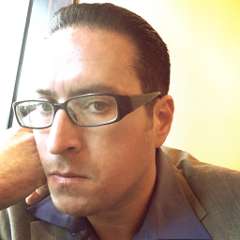Over the past hundred years there has been a great transformation in the general public’s idea of what a conductor is: from autocratic and glamorous auteur who is both the executant and collaborator of a composer’s vision, to that of efficient bureaucrat who leads an orchestra as primer inter pares through a musical score without imposing personal idiosyncrasies upon the performance. It is an interesting turn of destiny that the roster of the Philadelphia Orchestra’s music directors, beginning with Leopold Stokowski and currently underway with Yannick Nézet-Séguin, has neatly bookended this history. Michael Tilson Thomas, who led the orchestra as its guest over the weekend, stands athwart that history as a transitional figure.
On the one hand, Tilson Thomas’ style harkens back to the personalized direction of an earlier time, evidence of the lingering influence of his friend Leonard Bernstein. Indeed it is difficult to ignore that indebtedness when watching Tilson Thomas on the podium, who possesses a rich vocabulary of physical gesture that rivals that of his elder colleague. Yet Tilson Thomas has ultimately always been his own man with his own artistic vision. That was amply demonstrated in the grand, sweeping, but never distended Tchaikovsky Pathétique he shared with his Kimmel Center audience.
It has often been the case that the older conductors get, the slower they become. Tilson Thomas will have none of that. With his lean physique and aquiline features, Tilson Thomas cuts a striking and youthful figure on stage. Much of that is reflected in the sound he drew from the Philadephians in the Tchaikovsky. His approach was balletic at times, agile. One need only have heard the pert phrasing of the cellos in their melodies and countermelodies in the limping 5/4 waltz, the sparkling winds of the implacable march, for example, to imagine before one’s mind’s eye troupes of dancers bounding across, giving physical contours to this music with athletic exuberance. At the same time the gravitas in this music was always kept at the fore, as certainly there must be in this score that the composer considered to be his most honest symphonic statement. But it was pathos with dignity, darkness in which the light of hope yet flickered. There was no agonizing in the first-person singular. Instead Tilson Thomas' rendering was a careful and loving observation in the third person; detailed and even impassioned, but always remaining at a distance.
Nowhere was this best exemplified than in the closing Adagio lamentoso, the sweetness and nobility of the Philadelphia strings here leaving their prominent mark. If there was resignation in these closing pages, then it was of the sort done on the composer’s own terms, his head held high to the very end. The cello’s and basses’ pianissimi in the coda were breathtakingly soft, yet articulate. Tilson Thomas and the Philadelphia Orchestra had woven a tapestry out of this score into which not only sorrow and pain had been threaded, but those, too, of the brightly gleaming strands of love and acceptance.
On a less exalted plane was the work and performance that opened the program, a work by Tilson Thomas himself based on the poetry of Carl Sandburg. Gestating in the composer’s mind for forty years, Four Preludes on Playthings of the Wind was not completed until 2016. Listening to it, one can grasp why the composer may have had trouble with the work. Traipsing insecurely between satire and seriousness, “classical” and “Broadway”, the recital and theatre stages, the score ultimately fell short on all accounts. Another composer, perhaps, would have more capably juggled these contrasting and opposing styles into one coherent work. (Bernstein here again comes to mind.) The semi-staged performance – adeptly sung by Measha Brueggergosman, who was joined by Mikaela Bennett and Kara Dugan – only heightened the aimlessness of the score. If one could at least say that it did not detract from the performance, than one also had to concede that neither did it aid.
No, it was Tilson Thomas the recreative musician, who rightfully should have been the focus of attention on that program; who over the decades has honed his art into mastery equalled by very few others today – and is exceeded by none.


